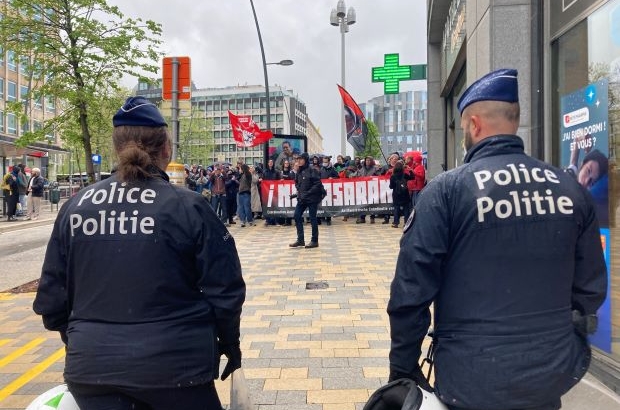- Daily & Weekly newsletters
- Buy & download The Bulletin
- Comment on our articles
Right-wing conservative conference went ahead in Brussels despite attempts to shut it down
A hard-right National Conservatism Conference in Brussels that sparked a political outcry, finally went ahead despite attempts by local politicians to shut it down, report local media.
The event at the Claridge venue in Saint-Josse-ten-Noode was cancelled twice by mayor Emir Kir. He issued a ban on the event around midday on Tuesday, saying that “based on the advice of my police chief and OCAD [Belgium’s counter-terrorism authority], I decided to issue a police order to ban the event… There is a risk of public disorder if this conference takes place.”
But while police officers were immediately sent to the site to enforce the order, in the end they didn’t interrupt the meeting in progress, according to the Brussels-North police zone.
“For practical reasons, and given that some participants and speakers had already arrived in the morning, we did not evacuate them,” said the police zone’s spokesperson Audrey Dereymaeker.
Although the event carried on, access was barred to anyone wishing to join while the conference was in progress.
But mayor Kir’s attempt to stop the conference backfired. His ban was quashed by a Belgian court and drew criticism from Belgian prime minister Alexander De Croo. “What happened at the Claridge today is unacceptable,” he wrote on social media.
“Communal autonomy is a cornerstone of our democracy, but it can never take precedence over the Belgian constitution, which has guaranteed freedom of expression and peaceful assembly since 1830. Banning political meetings is unconstitutional. Full stop.”
De Croo’s office also added that it was “bizarre” that the conference had already been underway for two hours before any action was taken. Moreover, there had been no security problem of sufficient magnitude to interrupt the conference.
The National Conservative Conference (NatCon) gathered some 40 leading figures of conservative, religious and far-right stripes, including Hungarian prime minister Viktor Orbán, Vlaams Belang MEP Tom Vandendriessche, French politician Eric Zemmour and Britain’s Nigel Farage and Suella Braverman.
Two other Brussels mayors issued a moratorium on the event and the conference was the subject of controversy and mobilisation. The event's co-organiser, the Mathias Corvinus Collegium (MCC) Brussels managed to book the Claridge, an event space, after previous attempts to secure a venue failed.
Around 100 demonstrators gathered in Saint-Josse to protest against the conference. “We’ve been mobilising for a dozen days to prevent NatCon from taking place,” said Camille of Coordination Antifasciste Belgium, which initiated the protest.
“[We] believe that allowing such a conference to take place encourages and participates in the dissemination of far-right ideas such as nationalism, racism and sexism.”
British Conservative prime minister Rishi Sunak considered the decision by Brussels authorities to ban the conference “extremely worrying,” according to his spokesperson.
Vlaams Belang politician Filip Dewinter adopted a similar position: “We are in the capital of Europe, and free speech is an important good in a democracy. I find it very painful that in Brussels of all places it is not possible to allow dissident voices to be heard as well.”
While the event’s organisers say they had permission from local authorities, mayor Kir claimed that “the municipality gave absolutely no permission for this event. I was surprised when I was informed [of it].”
The operator of Claridge told BRUZZ that mayor Kir had asked him not to allow the event to go ahead, but that after consulting his lawyers he chose to honour the agreement with the NatCon organisers.
As a result of the political storm around the event, commentators say right-wing political parties and groups have been galvanised in their Euroscepticism ahead of critical elections in Belgium and Europe this year.
Photo: ©Belga/Lou Lampaert




















Comments
Whether one agrees or not with their politics, they do have a right to meet together I'd have thought. It's not like they were out in the streets demonstrating or protesting.